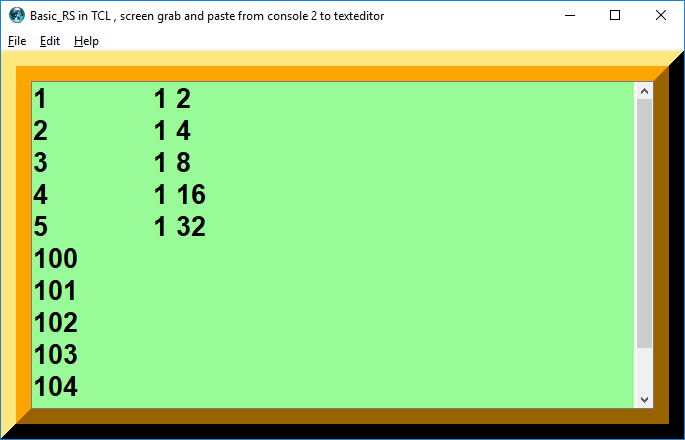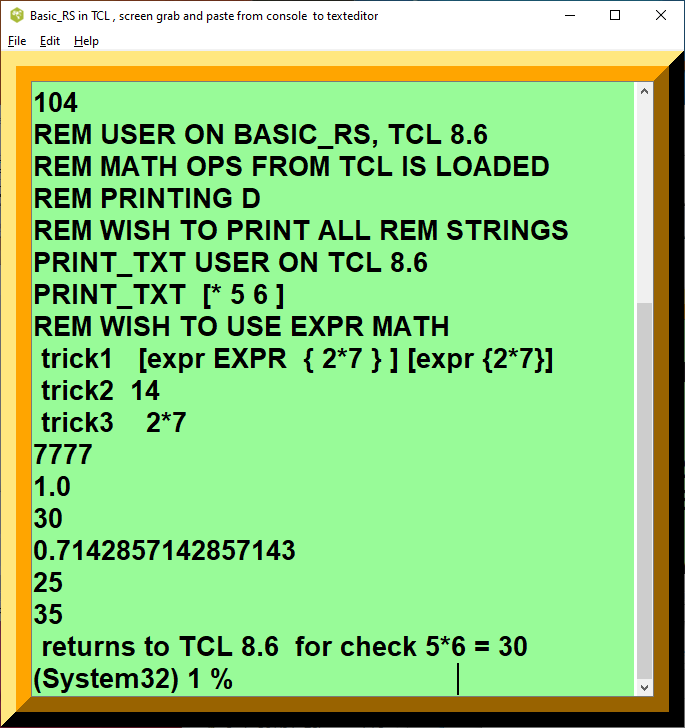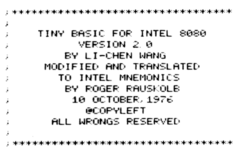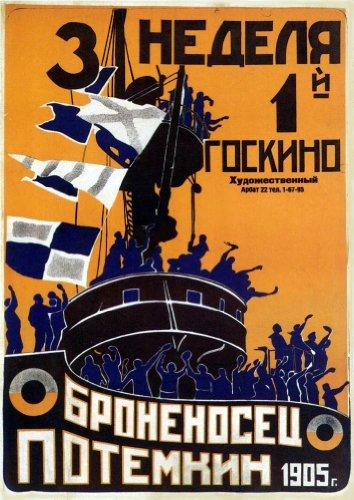Basic_RS V2 in TCL as partial Basic language interpreter ed
tiny_basic_RS V2 in TCL as partial Basic language interpreter
This page is under development. Comments are welcome, but please load any comments in the comments section at the bottom of the page. Please include your wiki MONIKER and date in your comment with the same courtesy that I will give you. Aside from your courtesy, your wiki MONIKER and date as a signature and minimal good faith of any internet post are the rules of this TCL-WIKI. Its very hard to reply reasonably without some background of the correspondent on his WIKI bio page. Thanks, gold 20Sep2020
Title: Demo tiny_basic_RS V2
- tiny_basic_RS V2 in TCL as partial Basic language interpreter
- Preface
- Introduction
- Alternate text gist
- Query. Who used small basic interpreters?
- Screenshots
- figure 1. Basic_RS V1 as vaporware
- figure 2. Basic_RS V2 in TCL
- figure 3. Announcement
- figure 4. Battleship_Potemkin of computer geeks
- References:
- * Pretty Print Version
- Extension Code for console screens
- Equivalent One Liners Programs using tiny_basic_RS.tcl
- Hidden Comments Section
Preface
gold 20aug2020 Here is extension of program written by Richard Suchenwirth RS in 2000, Basic in TCL.
Introduction
Called tiny_basic_RS V2 in TCL as partial Basic language interpreter. Learning experience, Added some easy eye console displays for my bad eyes. And trying some new features. Some math calculation forms seem to be working. I would like to add a smoother invoking of expr and regexp into the <tiny_basic_RS>.
Alternate text gist
gold 2/28/2024 Alternate text gist: Tiny Basic, one of the first programming languages, was initially distributed as assembler code for the Altair and the 8080 circuit board. As a historical legacy, it played a significant role in breaking the monopoly of its time. Originally priced at around $150 each, the original Altair BASIC became the first-ever freeware or free software package, which was widely distributed in the 1970s. The impact of Tiny Basic on the computing world can be compared to the Battleship Potemkin for computer geeks, symbolizing a revolutionary moment in history. The analogy of using Tiny Basic to control the large TCL language is like employing an Apple computer as an interface for a human operator in front of a Cray computer. Since the human mind is limited in its ability to understand and use complex instructions, a simplified interface, such as TCL language, can be useful for processing information. After all, the human brain was designed to chase rabbits.
source tiny_basic_RS.tcl
basic { 10 n=2/7. : 20 print n} ;# returns 0.2857
basic { 10 n=[/ 2 7. ]: 20 print n} ;# returns 0.2857
basic { 10 n={2/ 7.}: 20 print n}: 20 print n} :# returns 0.2857
# basic { 10 n=[ expr {2/ 7.} ] : 20 print n} ;#
# tiny_basic_RS.tcl not invoking expr & regexp smoothly
# keeper string map {\{ "" \} ""} $itemGathering some references on tiny basic and really surprised how much interest in computer theory of tiny basic. From what i can tell, Richard Suchenwirth has most or all of the original features of Tiny Basic, circa 1976.
Query. Who used small basic interpreters?
Question from member AV in Russia. So small basic interpreter... Query. Who used small basic interpreters?
gold 11/2/2020 A. The original tiny basic was distributed in assembler code for the Altair and the 8080 circuit board. Essentially, tiny_basic is a historic legacy of mankind. The original Altair BASIC was about 150 dollars each. Some USA programmers in the 1970s gave away tiny_basic free to break the monopoly. tiny_basic was the first freeware or free software package widely given to the masses (circa 1970). In Russian terms, tiny_basic is the Battleship_Potemkin of computer geeks.
The analogy of using tiny_basic to control the large TCL language is like sticking an Apple computer for the human operator in front of a Cray computer. The human mind probably can only understand and use a limited set of instructions, an interface in hardware or TCL? language as a limited set of instructions might be useful. After all, the human mind was designed to chase rabbits.
Screenshots
figure 1. Basic_RS V1 as vaporware
figure 2. Basic_RS V2 in TCL
figure 3. Announcement
figure 4. Battleship_Potemkin of computer geeks
References:
- Wikipedia search engine < Fortran >
- Wikipedia search engine < BASIC Programming >
- Wikipedia search engine < Programming Examples >
- Google search engine < Qbasic >
- Google search engine < Polish notation >
- Book >> Python Crash Course: A Hands-On , by Eric Matthes
- Oneliner's Pie in the Sky
- One Liners
- One Liners Programs Compendium [L1 ]
- WIKI BOOKS, Programming_Examples pdf
- WIKI BOOKS, Tcl_Programming_Introduction pdf
- WIKI BOOKS, Tcl_Programming_Introduction
- google search engine < Quickbasic>
- BASIC
- en.wikipedia.org wiki BASIC
- en.wikipedia.org wiki QBasic
- Call Procedure Like Fortran Example
- Basic in TCL
- [L2 ] Draft Wikipedia article on One Liners Programs , TCL Tool Control Language
- [L3 ] QBasic wikipedia
- [L4 ] QBasic wikibook
- Palo Alto Tiny Basic by Li-Chen Wang
- originally appeared in Issue No.5, May 1976 of Dr.
- Dobb's Journal.
- SCELBAL - 8008/8080 SYSTEMS, By Mark Arnold and Nat Wadsworth
- Tiny Basic, all numbers are integers,
- INTERFACE AGE, By Roger Rauskolb
- rare books, Dr Dobb's Journal of Computer
- Calisthenics Orthodontia Apple Tiny Basic 6502
- QBasic By Example, Special Edition, Que Publishing,1565294394
- QBASIC Programming for Dummies, by Douglas Hergert ,1994
- NSC_Tiny_BASIC_Users_Manual_Nov80.pdf
- SC/MP gets Tiny-BASIC
- The Arduino Inventor’s Guide:
- Learn Electronics by Making 10 Awesome Projects
- using tiny basic games and programs,
- 13 Pages, 2004
- Popular Science, Electronics-Experimenter's-Handbook-1979
- ES MP5 Game Player - support GBA, GBC, SMD, SFC, NES formats
- Tcl implementations
- The Very Minimal Tcl Core Command Set
- Does Tcl still fit on 16-bit microcontrollers?
- MicroTcl for Tcl9
- dbohdan's list of embedded scripting languages
- [L5 ] www.levenez.com history of computer languages
- A little math language revisited
- A little math language
- Tcl Math Syntax is Inferior to JavaScript/Python/Ruby/C/C++/Java/Perl/PHP
- Numerical Analysis in Tcl
- a little proving engine
- Parsing Polish notation
- let
- let - a simpler sugar for expr
- Tcl and LISP Richaerd Suchenwirth
- AMG's language ideas
- Let's assign with let
- The L Programming Language or
- Tcl for C Programmers, Oscar Bonilla, Tim Daly, Jr., Larry McVoy
- search keywords <Avoiding Brackets>
- Assign using equals
- Partcl - a minimal Tcl interpreter
- Tiny Tcl 6.8 is a rommable,
- minimal Tcl for embedded applications.
- Basic256, So You Want to Learn to Program?, English pdf
- James M. Reneau, M.S., Shawnee State University
- Portsmouth Ohio USA
- German Tutorial for Basic256 , basic256.pdf (Public Domain).
- Some Basic256 documentation is available in
- English, Russian, Dutch, German, Spanish and Portuguese.
- SourceForge net, BASIC256, basic language for schools
Appendix TCL programs and scripts
* Pretty Print Version
# Title: tiny_basic_RS in TCL V2
# partial basic language interpreter tiny_basic_RS
# demo basic from RS, (wiki 2000-08-21)
# Original program by Richard Suchenwirth on TCL WIKI
# wiki page titled Basic in TCL
# Reorganized code from, https://wiki.tcl-lang.org/915
# for green screens, print, and self_help
# to tcl console.
# search keywords < tiny basic 1976 >
# written on Windows 10 on TCL
# working under TCL version 8.6
# on TCL Club , 20Sep2020
# added statements for TCLLIB library
package require math::numtheory
package require math::constants
package require math::trig
package require math
namespace path {::tcl::mathop ::tcl::mathfunc math::numtheory math::trig math::constants }
# Tried to keep clean RS code in upper section
# added extension for console presentation below.
# added simpler sugar for expr Sarnold 2005-11-10
# wiki page >> let - a simpler sugar for expr
global a b c d e f g h i j k l m n o p q r s t u v w x y z
global A B C D E F G H I J K L M N O P Q R S T U V W X Y Z
#begin Sarnold 2005-11-10 code
proc let {varname assign args} {
# author Sarnold 2005-11-10
global a b c d e f g h i j k l m n o p q r s t u v w x y z
global A B C D E F G H I J K L M N O P Q R S T U V W X Y Z
upvar $varname leftvalue
if {[llength $args]==1} {
set args [lindex $args 0]
}
set args [uplevel expr $args]
switch -exact -- $assign {
+= {set leftvalue [expr {$leftvalue+$args}]}
-= {set leftvalue [expr {$leftvalue-$args}]}
*= {set leftvalue [expr {$leftvalue*$args}]}
/= {set leftvalue [expr {$leftvalue/$args}]}
%= {set leftvalue [expr {$leftvalue%$args}]}
= {set leftvalue $args}
# author Sarnold 2005-11-10
default {error "invalid syntax : second argument is not an assignment"}
}
return $leftvalue
}
# begin RS code
# One liners program
# basic style let in one line
proc let2 {_var expr} {upvar 1 $_var var;set var [uplevel 1 [list expr $expr]] } ;# RS
#Usage let a {999999} ; puts $a
proc lpush {_list what} {
upvar $_list L
if ![info exists L] {set L {}}
set L [concat [list $what] $L]
}
proc lpop {_list} {
upvar $_list L
if ![info exists L] {return ""}
set t [lindex $L 0]
set L [lrange $L 1 end]
return $t
}
proc intgen {{seed 0}} {
set self [lindex [info level 0] 0]
proc $self "{seed [incr seed]}" [info body $self]
set seed
} ;# RS
proc basic {script} {
global a b c d e f g h i j k l m n o p q r s t u v w x y z
global A B C D E F G H I J K L M N O P Q R S T U V W X Y Z
# old BASIC had 26 numeric variables..
foreach i {A B C D E F G H I J K L M N O P Q R S T U V W X Y Z} {
set $i 0
}
set states ""
set Stack [list Error:Stack]
foreach line [split [string toupper $script] \n] {
if [regexp { *([0-9]+) +(.+)} $line -> label rest] {
set outline ""
foreach stmt [split $rest :] {
set step 1
if [regexp { ?('|REM)} $stmt] {
# start extension for console
# wish to print all comments
puts $stmt
break ;# no statements to be expected after comment
} elseif [regexp { ?('|PRINT_TXT)} $stmt] {
# wish to print specific text
puts $stmt
break ;# no statements to be expected
# insert extension code here
} elseif [regexp {PRINT +(.+)} $stmt -> what] {
regsub -all ", *" $what "\t" what
regsub -all "; *" $what " " what
regsub -all {([A-Z])} $what {$\1} what
append outline "puts \"$what\"; "
} elseif [regexp {FOR +([A-Z]) *= *(.+) TO (.+)( STEP (.+))?} \
$stmt -> looper from to - step] {
regsub -all {([A-Z])} $from {$\1} from
regsub -all {([A-Z])} $to {$\1} to
set here -[intgen]
set step 1 ;# to start with
set next($looper) "incr $looper $step; if {\$$looper<=$to} {goto $here}"
append outline "set $looper $from\}\n$here \{"
} elseif [regexp {NEXT (.+)} $stmt -> id] {
append outline $next($id)
unset next($id)
} elseif [regexp {IF +([^ ]+) +(THEN|GOTO) +([0-9]+)}\
$stmt -> cond - goto] {
regsub -all {([A-Z])} $cond {$\1} cond
append outline "if {$cond} {goto $goto}; "
} elseif [regexp {ON (.+) GOTO +(.+)} $stmt -> cond labels] {
regsub -all {([A-Z])} $cond {$\1} cond
append outline "goto \[lindex \{- [split $labels ,]\} \[expr $cond\]\]; "
} elseif [regexp {GO *TO ([0-9]+)} $stmt -> id] {
append outline "goto $id; "
} elseif [regexp {GO *SUB ([0-9]+)} $stmt -> id] {
set here -[intgen]
append outline "lpush Stack $here; goto $id\}\n$here \{ "
} elseif [regexp {RETURN} $stmt] {
append outline "goto \[lpop Stack\]; "
} elseif [regexp { *END} $stmt] {
append outline "break; "
} elseif [regexp {([A-Z])=(.+)} $stmt -> lhs rhs] {
regsub -all {([A-Z])} $rhs {$\1} rhs
append outline "set $lhs \[expr $rhs\]; "
}
}
append states "$label {$outline}\n"
}
}
states $states
} ;#RS
proc states body {
proc goto {id} {uplevel set goto $id; return -code continue}
uplevel set goto [lindex $body 0]
set tmp [lindex $body 0]
foreach {cmd label} [lrange $body 1 end] {
if {$label==""} {set label default}
lappend tmp "$cmd; goto [list $label]" $label
}
lappend tmp break ;# to match last "default" label
uplevel while 1 "{switch -- \$goto [list $tmp]}"
rename goto ""
} ;#RS
basic {
100 J=1:K=1
110 GOSUB 300
120 PRINT I,J;K
130 IF I<5 GOTO 110: REM DONE
135 for a=100 to J+103
137 print a
140 next a
150 END
300 REM---------- slight increment
310 I=I+J: K=K*2
320 RETURN
}
# end of RS deck
# add cosmetics below to bottom of file or source tiny_basic_RS.tcl
# added statements above for TCLLIB library
console show
console eval {.console config -bg palegreen}
console eval {.console config -font {fixed 20 bold}}
console eval {wm geometry . 40x20}
console eval {wm title . "tiny_basic_RS in TCL , screen grab and paste from console to texteditor"}
console eval {. configure -background orange -highlightcolor brown -relief raised -border 30}
console eval { proc self_helpx {} {
set msg "tiny_basic_RS in TCL, large black type on green
from TCL,
self help listing
Conventional text editor formulas grabbed
from internet screens can be pasted
into green console
colon is statement end
# test statements for mixed tiny_basic_RS w/ TCL (let proc)
# demo program tiny_basic_RS
basic {
100 J=1:K=1
110 GOSUB 300
120 PRINT I,J;K
130 IF I<5 GOTO 110: REM DONE
135 for a=100 to J+103
137 print a
140 next a
150 END
300 REM---------- slight increment
310 I=I+J: K=K*2
320 RETURN
}
# basic { 10 N=[ expr {2/ 7.} ] : 20 print N} ;#
# tiny_basic_RS.tcl not invoking expr smooth
# demo tiny_basic from RS, (wiki 2000-08-21) "
tk_messageBox -title "self_helpxx" -message $msg } }
console eval {.menubar.help add command -label Self_help -command self_helpx }
# proc basic here is a second program or set of commands
basic {
50 REM user on tiny_basic_RS, TCL 8.6
70 REM math ops and proc let from TCL is loaded
80 REM mixed tiny_basic_RS w/ TCL (let proc)
100 a=1.
137 print a
140 b= [* 5 6 ]
150 print b
160 c= [/ 5 7. ]
170 print c
175 REM PRINTING D
180 d=5*5
200 print d
250 print [* 5 7 ]
300 REM wish to print all REM strings
315 PRINT_TXT user on TCL 8.6
318 PRINT_TXT [* 5 6 ]
340 REM wish to use expr math
350 EXPR { 2*7 }
400 RETURN
}
puts " returns to TCL 8.6 for check 5*6 = [* 5 6 ]" Extension Code for console screens
# begin extension for console, marked in above deck.
# need smoother invoking of expr and regexp assignment
# into the <tiny_basic_RS>.
# would not mind a alternate assignment ==
} elseif [regexp { ?('|EXPR)} $stmt] {
# wish eval content to expr
# $w move [$w find withtag "$tilex"] [expr {$x-$p(X)}] [expr {$y-$p(Y)}]
#set numberx [$w gettags current]
#regexp {obj_(\d+)} $numberx -> tilex
puts " trick1 \[expr $stmt \] \[expr {[lindex [split $stmt ] 3 ]}\]" ;
puts " trick2 [expr [expr {[lindex [split $stmt ] 3 ]} ]]" ;
puts " trick3 [expr {[lindex [split $stmt ] 3 ]} ] " ;
set tilex 7777;
regexp {EXPR(\a+)} $stmt -> tilex;
puts $tilex;
break ;# no statements to be expected
# end extension for console. Equivalent One Liners Programs using tiny_basic_RS.tcl
source tiny_basic_RS.tcl
basic { 10 n=2/7. : 20 print n} ;# returns 0.2857
basic { 10 n=[/ 2 7. ]: 20 print n} ;# returns 0.2857
basic { 10 n={2/ 7.}: 20 print n}: 20 print n} :# returns 0.2857 Hidden Comments Section
Please include your wiki MONIKER and date in your comment with the same courtesy that I will give you. Thanks, gold 12Aug2020
gold 9/27/2021. Switched some comment signs ;# to #. This a big file. Check earlier editions, if not compatible. Maybe obvious, but this page was written on Windows10 Tcl ports including ActiveTCL. I assume reader can cut and paste on screen, what the reader needs, and tootle on to his own project and own contribution pages to the TCL Wiki.
| Category Numerical Analysis | Category Toys | Category Calculator | Category Mathematics | Category Example | Toys and Games | Category Games | Category Application | Category GUI |



